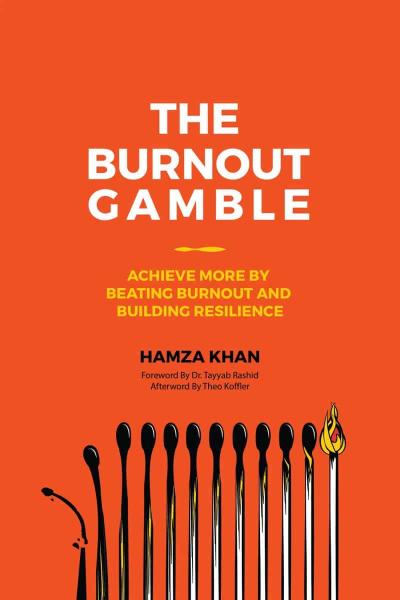
Hamza Khan dedicates his life to empowering post-secondary students.
“A problem I hope to fix in my lifetime is the lack of information about different ways to fund your education and alleviate financial worries and burdens,” said the managing director of Student Life Network, a resource hub for Canadian students.
Some students are working several jobs to fund their education on top of the rigorous demands of their programs, which can lead to burnout, a phenomenon that is not reserved for workers and employees outside of academia.
The author, consultant, speaker and teacher at Ryerson University and Seneca College spoke to a Microsoft Teams audience recently as part of Humber’s Wellness Talks, presented by the Principal’s Office at the Humber Lakeshore Campus, the Human Resources and Organizational Effectiveness Team.
His talk, “The Burnout Gamble,” explored his journey from over-achiever experiencing severe burnout, to high performer who successfully blends his life with his work. The event was attended by the Humber community, including students who he hoped would benefit from the frank conversation about the realities of hustle culture. 
He told a story about his ‘year of #hustle,’ in 2014, when he worked nine-hour days seven days a week. As he burned out, unbeknownst to him, he became less productive and made mistakes his team had to fix.
At the end of the year, he booked a vacation to reward himself.
“I thought I could flame out like a phoenix and work intensely over the course of the year, take a trip around the world and somehow recover from the ashes ready, reborn and able to hustle again.”
The day Khan was meant to leave, he experienced a crippling panic attack and missed his flight.
Khan says the burnout phenomenon affects people in every sector and job, and the number of people experiencing negative symptoms due to overwork is on the rise.
He suggests returning to essentialism in people’s professional lives – and their academic pursuits.
“The solution is not to have a few more hours in the day. It’s to waste less time and reduce things that cause distraction and persistent stress. Calmer equals more productive,” he said.
“It helps if your goals are defined and specific. If you need to, resign from a committee, or don’t go to a meeting that doesn’t require your attendance. Make ‘no’ your default response.”
Khan shared what has worked for him, including overcoming the idea of achievement. He now takes regular breaks no matter the cost to productivity, from lunch breaks to vacations.
He notes that the greatest protection from burnout, though, is to increase your ability to adapt to stress.
“Intentionally increase the difficulty and levels of stress in a controlled way in a time of general peace is the best way to prepare ourselves for the future,” he said.
Post-secondary students today face unprecedented challenges, in part because of the COVID-19 outbreak, but also because of the current economic climate.
“I want people to know that taking on loans and working in precarious positions to pay tuition and student debt doesn’t have to be the only answer,” said Khan.
“I see an alarming trend in conversations with students and young people in general. The first few months of the pandemic really turned people off post-secondary and some thought of it as something they can afford to skip,” he said.
He urges them to be patient as institutions work to recreate the experience of being on campus.
“It’s the best time to be enrolled in college while the world is experiencing volatility and ambiguity. Being in this sanctified space, you’ll thank yourself for doing this. To forfeit higher education at a time like this robs you of the opportunity to develop higher productivity in the future.”
A more digital and automated world, he adds, will be require more collaboration and creativity than ever and college is the perfect place to develop those skills.
Khan’s initiative, the Student Life Network, connects students to scholarships, grants and bursaries they may never even have considered.
“Some of them are so niche that they literally have your name on them.”
He recently found a scholarship open to parents of high school-aged children who are, themselves, transitioning into post-secondary education in college. 
Humber, too, offers many scholarships, catering to a variety of new and current students. To learn more about how to access financial support at Humber, visit the Scholarships & Bursaries website.
Stress doesn’t have to lead to burnout and Khan wants people in the workforce – and those who are training to enter it – to understand that there are strategies to prevent such a mental health crisis.
As many struggle with stress and overwork, Humber College is ensuring access to support services for students who need them. Students can book online counselling appointments using counselling@humber.ca. If their need is immediate, they can access the Good2Talk Helpline or use Therapy Assist Online, which provides virtual tools.